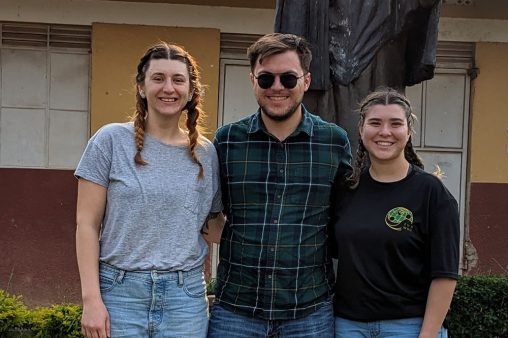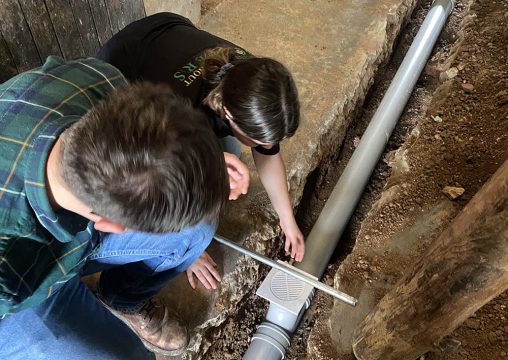
From left: Students in Wright State’s Engineers Without Borders chapter Taylor Jacobs, Riley Croghan and Diana Johnson completed a sanitation project at St. Bakhita’s Secondary School in Uganda.
A pair of Wright State University engineering majors spent winter break completing the finishing touches on a humanitarian project to provide better sanitation for a rural school for girls in a Ugandan village.
Diana Johnson and Taylor Jacobs are members of Wright State’s chapter of Engineers Without Borders, a national organization that helps meet basic human needs in other countries.
Johnson is a junior from Troy majoring in industrial and systems engineering and minoring in computer science. She recently completed a term as chapter president.
Jacobs is a senior from Columbus majoring in mechanical engineering and is the chapter’s international project lead.
They left on Dec. 29 for a 30-plus-hour flight to the village of Kabingo in Uganda. They helped complete work started by previous Wright State students to build a clean water, restroom and hand-washing station at St. Bakhita’s Secondary School. Wright State joined the project in 2018.
The two students were at the school for seven days of their 10-day trip. They arose at 7 a.m. each workday for a roughly 90-minute drive to the remote school, where they worked a six-hour shift before returning to a guest house in Kabingo.
“When we got there, we assessed what had changed between the trip two years ago and now,” Jacobs said, adding that changes needed to be made for the overarching sanitation project.
The sanitation project included adding handwashing stations, improving latrine conditions, reducing standing water left in washrooms and improving grey water discharge.
Johnson said the project made a positive difference in the life of the school and its students.
“Doing this sanitation project helped keep down the amount of disease,” she said.
Jacobs said improving the school’s sanitation facilities allows more female students to stay in the residence halls.
“It provides a safe space there where they can receive clean drinking water and basic necessities,” she said.
Jacobs said that aspect was the biggest takeaway for her about the trip. Participating in volunteer work from an engineering perspective was also a first.
“Usually it’s been missionary work or manual labor,” she said

Wright State students built handwashing stations and improved latrine conditions at the rural school in Uganda.
Johnson’s lasting impression was that, and more.
“It was a new experience, to see a different way of life in person, not just on television,” she said. “I learned so much about the construction process — mixing concrete and mortar. Also, I had never before flown on an airplane.”
“She handled it so well,” Jacobs said of her classmate’s first flight.
Now that they are back at Wright State, Johnson and Jacobs are continuing their education. Johnson is finding an affinity for her computer science studies and will continue participating in the Engineers Without Borders chapter.
Taylor will help train the chapter’s next international project leader and help the chapter find a new mission. After graduation, she hopes to land a job in the materials or HVAC industries and continue working with Engineers Without Borders.
“Since starting at Wright State, my life has come full circle,” Jacobs said.
Originally, she studied engineering at another school, but, as she put it, “life happened” and she returned to Columbus. She worked as a hairstylist for a while until the pandemic, which stifled her business.
Later she enrolled at Wright State in mechanical engineering and is now on track to graduate in December.
Jacobs finds Wright State’s engineering community to be tight-knit and supportive.
Johnson shares Jacobs’ affinity for Wright State.
“My favorite thing is that there are so many opportunities. Getting involved is so much easier here than I expected,” she said. “The faculty are clearly invested in your future.”

 Wright State to expand nursing facilities to meet workforce needs and prepare more graduates for in-demand careers
Wright State to expand nursing facilities to meet workforce needs and prepare more graduates for in-demand careers  Wright State student-athletes make a lasting impact on local family with more to come
Wright State student-athletes make a lasting impact on local family with more to come  Wright State names Rajneesh Suri dean of Raj Soin College of Business
Wright State names Rajneesh Suri dean of Raj Soin College of Business  ‘Only in New York,’ born at Wright State
‘Only in New York,’ born at Wright State  Wright State president, Horizon League leaders welcome new commissioner
Wright State president, Horizon League leaders welcome new commissioner 